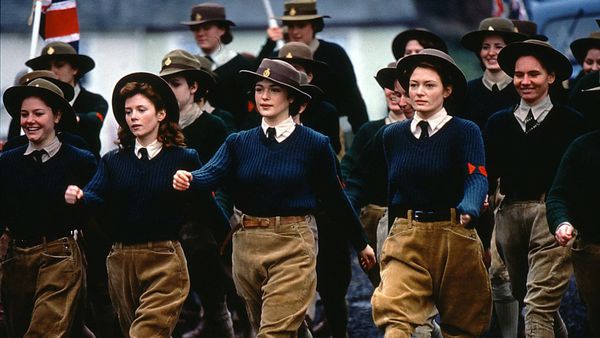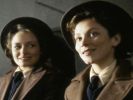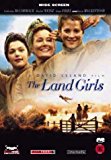Eye For Film >> Movies >> Land Girls (1998) Film Review
Land Girls
Reviewed by: Angus Wolfe Murray

During the last war, when men of fighting age were kicking Hitler, Britain had to feed itself, which meant replacing recruited farm workers with... ssshhh (females). They called themselves The Women's Land Army and came from all walks of life, more often than not city girls who had never smelt the sweet breath of a cow, or known the sodden treachery of an autumnal tattie field in their lives.
David Leland's film is more interested in sex. One of the problems land girls had, in addition to prejudice against anyone in skirts doing physical work outside the kitchen, was a lack of eligible blokes. Movies are allowed to cheat, otherwise where's the fun? And so Joe (Steven Mackintosh) is introduced, son of Farmer Lawence, engaged to a hearty, wholesome local lass, randy as a stoat and young enough to ride a motorbike flat out through mud, laughing his head off.

Stella (Catherine McCormack) is middle-class. Ag (Rachel Weisz) is upper-class. Prue (Anna Friel) is working-class. So far, so traditional. They end up in an attic bedroom in a Dorset farmhouse, lamplit after the generator is turned off, snug as bugs. Stella has a conventionally dull fiance in the Navy, who talks of walking the dogs and pruning the roses. Ag is 26 and still a virgin. Prue's not fussy. She'll take anything with the right equipment, Joe being the nearest.
There is no real attempt to show what farm life for townies was actually like. The buildings look mucky and tattered and it's usually raining, but Keith Dewhurst must have realised pretty quick that there wasn't much to be gained from pig swill jokes and so stuck to the perils of rural romance. Will Stella stay with her handsome stuffed dummy? Will Ag take the belt by its buckle and demand service? Will Prue cut in at the dance and discover heartache and pain? Can Joe keep his trousers up long enough to finish the ploughing?
It doesn't matter, because it's all make-believe. Everything seems predictable, dealing as it does with stereotypes, and yet you appreciate the effort Leland and others have made to bring Angela Huth's novel to life. The photography (Henry Braham) is exquisite. The design (Caroline Amies) has been diligently researched. The costumes (Shuna Harwood) are nostalgic scruff.
McCormack has the hardest task, hinting at feelings beneath the barrier of a strict upbringing, which she manages with delicate skill. Weisz, surprisingly, seems at odds with Ag, exaggerating her eccentricity and creating a caracature. Friel overdoes it in a different way. She has the most enjoyable part and the easiest, which she celebrates with a cascade of personality, culminating in a scene of grief that is genuinely moving. Everything about the film strains for quality and yet ends up, like Stella's fiance, terribly worthy and rather boring.
Reviewed on: 19 Jan 2001

















